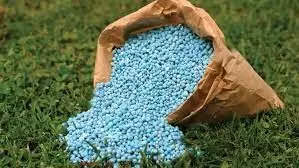- Home
- /
- Business/Economy
- /
- Nigeria has capacity...
Nigeria has capacity to produce 8m metric tonnes of fertiliser yearly – Official

Nigeria has the capacity to produce eight million metric tonnes of fertiliser every year.
The Programme Lead for African Fertiliser Initiative with the International Fertiliser Development Centre (IFDC), Mr. Sebastian Nduva, made this known while speaking at the NPK Technical Working Group Validation Workshop in Abuja.
The expert said that Nigeria had the largest number of registered fertiliser blending plants in Africa, and it’s close to being self-sufficient in NPK fertiliser production.
”Nigeria has 70 registered fertilizer-blending plants in the country. Unfortunately, due to the high cost of the major farm inputs, among other factors, about 500,000 metric tonnes are demanded,” he said.
Nduva also said that the high cost of fertilisers was due to the importation of 40 percent of the raw materials used for fertiliser production, the local price of farm input influenced by global forces, currency devaluation, and conflicts in Eastern Europe, among other factors.
He said stakeholders are of the opinion that if the government can take advantage of local production as well as an efficient and transparent system for the procurement and distribution of fertiliser, it will help reduce the cost for farmers.
Also speaking, the Senior Special Assistant to the President on Agribusiness and Productivity Enhancement, Dr. Kingsley Uzoma, commended the IFDC for aligning with the government’s objective to enhance food security.
Uzoma said that with the data provided on the dashboard, the federal government can offer valuable guidance to potential investors in the fertiliser industry.
He suggested the need for the programme to consider including fertiliser quality, saying the inclusion will provide a more comprehensive overview of the industry, benefiting both investors and government initiatives.
Also contributing, the President of the Fertiliser Producers and Suppliers Association of Nigeria (FEPSAN), Malam Abubakar Kasim, recalled that President Bola Tinubu has rolled out plans to distribute fertilisers to farmers.
The FEPSAN president also agreed that the fertiliser blending plants in the country have an installed capacity of eight million metric tonnes of NPK but have never produced more than two million metric tonnes due to a lack of raw materials and foreign exchange, among other limitations.
“Nigeria has the ability to be self-sufficient in fertiliser production, and if they get government support, they can produce more than enough to even supply the whole of Africa.
Abubakar said while they can assure the availability of the farm input, there is a need to discuss with the government measures to undertake in order to make fertiliser more affordable to people.



